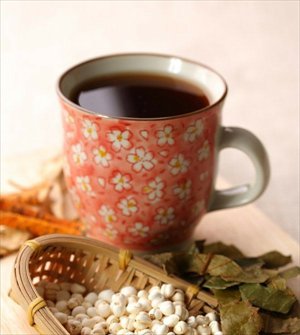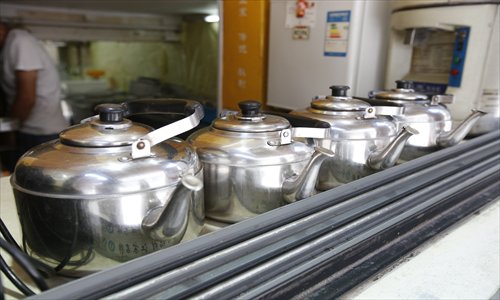Get swea-tea

Hong Kong-based Hung Fook Tong offers an assortment of herbal teas. Photos: Courtesy of hungfooktong.com

Hong Kong-based Hung Fook Tong offers an assortment of herbal teas. Photos: Courtesy of hungfooktong.com
Nick Cai has been living in Shanghai for over three years. Every summer the Guangdong native receives a package of liangcha (medicinal herbal tea) ingredients from his hometown. Drinking liangcha is a time-honored custom for people in South China, especially Hong Kong, Guangdong Province and Guangxi Zhuang Autonomous Region, as it is believed to help counter the heat and humidity of summer. Indeed, although liangcha can be consumed hot or cold, it literally means "cooling tea" because of its purported ability to cool the body down.
This summer, as Shanghai residents endure unprecedented high temperatures, Cai's herbal tea has unexpectedly become popular with his friends in the city.
Luckily, you don't need to have a Cantonese friend send you dried ingredients from down south to enjoy a refreshing cup of liangcha. Here are three herbal tea purveyors in Shanghai.
Old Chinese brand
Located down the narrow and quiet Xing'an Road away from the bustle of Huaihai Road Middle is the only Shanghai branch of the Guangdong-based brand Xu Qixiu Herbal Tea. The compact store has been in operation for seven years.
Xu Qixiu was born in 1870 into a family that ran a herbal tea business in Fogang, Guangdong Province, and later moved and settled down in the city of Yingde. He not only traded in herbal teas, but also prescribed them for local patients.
The herbal tea prescriptions of Xu's family were later passed down from generation to generation, and Xu Qixiu Herbal Tea has been recognized by the Ministry of Commerce as a China Time-honored Brand.
The Shanghai branch currently offers a dozen kinds of herbal tea, which are available in bottles and as tea bags. The bottled tea is made every morning and is kept fresh in the refrigerator.
On the menu are liangcha wang (literally, the king of herbal tea), which contains over 20 medicinal herbs and is said to relieve a sore throat; American ginseng tea boiled with pear and chrysanthemum, which is supposed to nourish the lungs; as well as maogen zhuzhe shui, Chinese sugar cane tea boiled with blady grass root that relieves the body's inner heat. The herbal teas are sold at 6 yuan ($0.97) per roughly 300-milliliter bottle.
Add: No.10, Lane 98 Xing'an Road
兴安路98弄10号
Tel: 138-1879-1243

The small herbal tea shop Ren Li De in Shanghai Photos: Cai Xianmin/GT
Shanghai prescription
Located next to Hongqiao Road Station, the small herbal tea shop Ren Li De has been popular among locals for roughly five years. But few people know that the store's owner is not Cantonese but a local Shanghainese.
Ren Zhenhua, the store owner and the tea maker at Ren Li De, was introduced to herbal tea by his Cantonese friends. Before setting up his business, Ren paid a visit to Shenzhen, where he learnt how to choose traditional Chinese medicine (TCM) herbs and how to brew good tea.
The TCM prescription used in Ren's tea is different from traditional Cantonese tea because the climate in Shanghai is not as wet as it is in Guangdong, said Ren.
In the summer, Ren recommends liangcha wang, ganmao cha (herbal tea to cure cold), ershisi wei (herbal tea containing 24 TCM ingredients), as well as shengdi lüdou (green mung bean drink with rehmannia root.)
Liangcha wang contains a total of 26 medicinal herbs, including lotus leaf, bamboo leaf and prunella, which can help to relieve constipation. Ganmao cha should be drunk in the early stage of a cold, within two days of experiencing symptoms, Ren advises.
Another delicacy served at Ren Li De is a white jelly known as yuzao gao, which is made from seaweed harvested in Shandong Province. After eight hours of boiling and filtering, the seaweed soup will turn into jelly.
The store also offers a selection of tortoise jelly, whose ingredients are all purchased in Guangxi, known for producing the best tortoise jelly in the country.
Ren Li De's herbal teas are sold for around 5 yuan, and the tortoise jellies are sold at around 6 yuan.
Add: 1501 Kaixuan Road 凯旋路1501号
Tel: 139-1852-5095
Convenient choice
The herbal tea in Ren's store will go bad in two days, according to Ren, as does his homemade tortoise jelly. If you're looking for liangcha with a longer shelf life, try the tea made by Hong Kong-based Hung Fook Tong. You can buy bottled Hung Fook Tong tea that can be enjoyed within one year from local convenience stores and its franchised outlets.
Established in 1986, Hung Fook Tong makes medicinal herbal tea without any additives. Since establishing its first branch on the Chinese mainland in Shenzhen in 2007, the brand has opened over 120 outlets nationwide, including three in Shanghai.
The newly opened branch in the Global Harbor mall near Jinshajiang Road Station stocks around 10 kinds of herbal tea and a range of juices and fruit pulps. Usually the herbal teas are sold at 6 yuan per bottle (500 milliliters), while the fruit pulps are priced at around 15 yuan per bottle (about 400 grams). The franchised outlets of Hung Fook Tong also offer delivery service for orders over 100 yuan.
Add: Room 102, B2/F, Global Harbor, 3300 Zhongshan Road North
中山北路3300号月星环球港B2楼102商户
Tel: 2606-4051